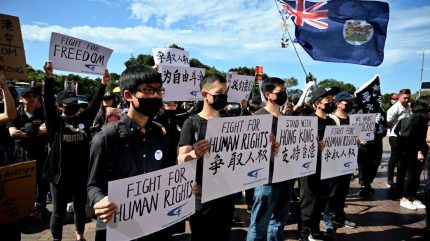
The US-China trade war has, understandably, dominated the attention of international media in recent years. However, Beijing’s fallout with Australia has been far more vicious but has garnered fewer headlines.
It is no exaggeration to say that relations between the two countries have hit a 50-year low. China, Australia’s main trading partner, has imposed an unprecedented number of sanctions on Australian trade since late 2020. Thirteen sectors have been targeted, representing 10% of the country’s exports (or $19bn).
Meanwhile, Chinese investment to Australia plummeted 61% in 2020, according to new data from researchers at the Australian National University (ANU). The 12-month period saw just 20 projects involving Chinese investors coming into Australia – down from a peak of 111 in 2016 – and across only three sectors: real estate ($461m), mining ($414m) and manufacturing ($153m).
“[This trend] reflects the effects of Covid but also more scrutiny of foreign investment by the Australian government, particularly that from China,” said ANU’s Dr Shiro Armstrong in a press release.
China singles out Australia for FDI cold shoulder
It is telling that, in 2020, Chinese investment to other countries did not fall as far as it did to Australia. Chinese investors are actively slamming the brakes on the country – and have been doing so for quite some time. Last year’s collapse of investment followed a 47% drop off in 2019.
A closer look at data is revealing (see chart below). Chinese investment to Australia has been falling for four years, primarily due to China’s global slowdown in foreign investment. However, the past two years have been unusually bad for Chinese-Australian deals. Investment from Chinese companies outside Australia fell massively in 2019. A year later, Chinese businesses already based in Australia turned off the tap too. Investors that already have operations in a country tend to be more resilient to political headwinds, or rather, less scared off by them. So it is a cause for concern when ‘internal’ foreign investment dries up too.
How well do you really know your competitors?
Access the most comprehensive Company Profiles on the market, powered by GlobalData. Save hours of research. Gain competitive edge.

Thank you!
Your download email will arrive shortly
Not ready to buy yet? Download a free sample
We are confident about the unique quality of our Company Profiles. However, we want you to make the most beneficial decision for your business, so we offer a free sample that you can download by submitting the below form
By GlobalDataOver the past five years, the global economy has seen a rise in protectionism. A significant part of this has involved governments increasing their scrutiny and control over inbound foreign investment.
While not in name, much of this has been driven by fear of Chinese investors, for better and for worse. At the forefront of this global trend has been the US and Australia, with Canberra often taking the leading role.
There is much that must be done on both sides to improve the perception of the Australian market to Chinese investors.
KPMG
In 2012, the Australian government banned Huawei from building the country’s national broadband network, a harbinger of similar actions to come in the US and UK. Australia has also taken the lead role in lobbying other countries to exclude Huawei.
Another significant moment came in 2016 at the UN, following Canberra’s criticism of Beijing’s South China Sea policy. That same year, Australia’s Northern Territory government decided to sell the Port of Darwin to a Chinese investor, a move that the national government has been embroiled in reversing (by veto).
Major Chinese deals that have already been barred by Canberra include the proposed sale of Australia’s largest landholder, the proposed $600m acquisition of Lion Dairy, and a $300m bid for a major Victorian construction contractor.
Another watershed incident was 2019’s foreign investment screening legislation, which subsequently gave the Australian government more grounds to halt investments deemed as national security threats (a practice used by China for decades). That same year, during Australia’s federal elections, there were very public reports of suspected foreign interference by China, which Beijing repeatedly denied.
Then, in 2020, Australia decreased the threshold for foreign investment reviews to an eye-watering $0 – meaning all deals can now be checked. Like many ‘Western’ countries, Covid-19 increased Canberra’s fear that Chinese investors would snap up distressed assets, something that has not borne out.
On top of this, 2020 saw Australia dial up the volume on its already vociferous condemnation of Beijing’s Uyghur ‘re-education’ camps and undemocratic clampdown on Hong Kong, not to mention loud calls for an independent investigation into the origins of Covid-19 in Wuhan.
Fear and loathing in Canberra and Beijing
All the above have combined to incense Beijing, which for several years now has accused Australia of racism and paranoia towards Chinese policy, investors and tourists, an allegation that has only grown in light of Covid-19.
It is no surprise, therefore, that back in 2019, the likes of KPMG were concluding their reports with: “There is much that must be done on both sides to improve the perception of the Australian market to Chinese investors.” The continuation of large-scale investment by new Chinese entrants is not expected in the short to medium term, said a mid-2020 KPMG report.
Relations have become much worse since then. Investment flows will recover, but for now, Australia remains an example of things to come for other ‘non-superpower’ nations that take on China.



